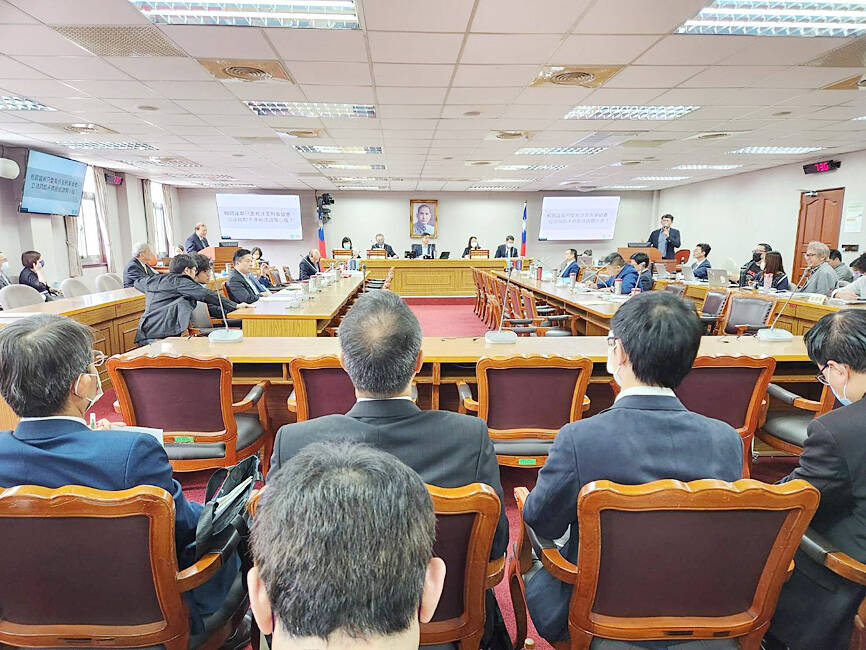Proposed legislation by Chinese Nationalist Party (KMT) lawmakers to make contempt of the legislature a punishable offense would have a chilling effect, making officials, citizens and civic groups unwilling to come forward to present information at the legislature, Deputy Minister of Justice Chen Ming-tang (陳明堂) said yesterday.
KMT caucus convener Fu Kun-chi (傅?萁), Weng Hsiao-ling (翁曉玲) and other legislators introduced bills focused on legislature reform, including amendments to the Criminal Code.
Chen told a meeting of the legislature’s Judiciary and Organic Laws and Statutes Committee that they have the right to address issues on exercising their authority as elected representatives, “but to introduce a ‘contempt of legislature offense would result in a chilling effect.”

Photo: Hsieh Chun-lin, Taipei Times
He pointed to the ultima ratio principle, which says that the repressive nature of the criminal justice system, and positioned it as the last resort of the legislator.
It is possible to overuse the criminal justice system to restrict rights and freedoms, and should therefore be applied in exceptional cases only, where other means cannot suffice to prevent offenses, he said.
“I ask lawmakers to reconsider this bill, which would make it a punishable offense for government officials and citizens to violate the ‘obligation to cooperate’ when requested by legislators,” Chen said.
Instead of adding it as a punishable offense under the Criminal Code, there are other ways of treating such matters, Chen added.
In a presentation, Legislative Yuan Secretary-General Chester Chou (周萬來) pointed to a bill amending the Act Governing the Legislative Yuan’s Power (立法院職權行使法) proposed by the KMT caucus to give lawmakers the right to hold public hearings — including those involving judicial investigations — and hearings to question government ministers.
Chou said the proposal would be deliberated to achieve a balance between the powers of the five branches of government, the need to protect state secrets and maintain the right of lawmakers to scrutinize policies and officials.
Chen pointed to constitutional interpretations No. 325, No. 585, No. 633 and No. 729.
“For amending portions relating to the Legislative Yuan’s power, we respect the opinions and viewpoints provided by the members of this committee... Although we must stress that it is important to conform to principle of proportionality under the Constitution, as well as the principle of clarity and definiteness of law and separation of powers,” Chen said.

‘DENIAL DEFENSE’: The US would increase its military presence with uncrewed ships, and submarines, while boosting defense in the Indo-Pacific, a Pete Hegseth memo said The US is reorienting its military strategy to focus primarily on deterring a potential Chinese invasion of Taiwan, a memo signed by US Secretary of Defense Pete Hegseth showed. The memo also called on Taiwan to increase its defense spending. The document, known as the “Interim National Defense Strategic Guidance,” was distributed this month and detailed the national defense plans of US President Donald Trump’s administration, an article in the Washington Post said on Saturday. It outlines how the US can prepare for a potential war with China and defend itself from threats in the “near abroad,” including Greenland and the Panama

A wild live dugong was found in Taiwan for the first time in 88 years, after it was accidentally caught by a fisher’s net on Tuesday in Yilan County’s Fenniaolin (粉鳥林). This is the first sighting of the species in Taiwan since 1937, having already been considered “extinct” in the country and considered as “vulnerable” by the International Union for Conservation of Nature. A fisher surnamed Chen (陳) went to Fenniaolin to collect the fish in his netting, but instead caught a 3m long, 500kg dugong. The fisher released the animal back into the wild, not realizing it was an endangered species at

The High Prosecutors’ Office yesterday withdrew an appeal against the acquittal of a former bank manager 22 years after his death, marking Taiwan’s first instance of prosecutors rendering posthumous justice to a wrongfully convicted defendant. Chu Ching-en (諸慶恩) — formerly a manager at the Taipei branch of BNP Paribas — was in 1999 accused by Weng Mao-chung (翁茂鍾), then-president of Chia Her Industrial Co, of forging a request for a fixed deposit of US$10 million by I-Hwa Industrial Co, a subsidiary of Chia Her, which was used as collateral. Chu was ruled not guilty in the first trial, but was found guilty

The Chinese Nationalist Party (KMT) is maintaining close ties with Beijing, the Democratic Progressive Party (DPP) said yesterday, hours after a new round of Chinese military drills in the Taiwan Strait began. Political parties in a democracy have a responsibility to be loyal to the nation and defend its sovereignty, DPP spokesman Justin Wu (吳崢) told a news conference in Taipei. His comments came hours after Beijing announced via Chinese state media that the Chinese People’s Liberation Army’s Eastern Theater Command was holding large-scale drills simulating a multi-pronged attack on Taiwan. Contrary to the KMT’s claims that it is staunchly anti-communist, KMT Deputy